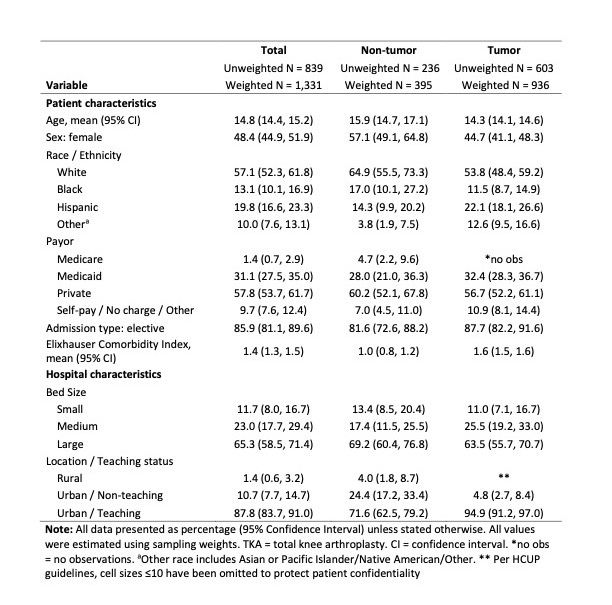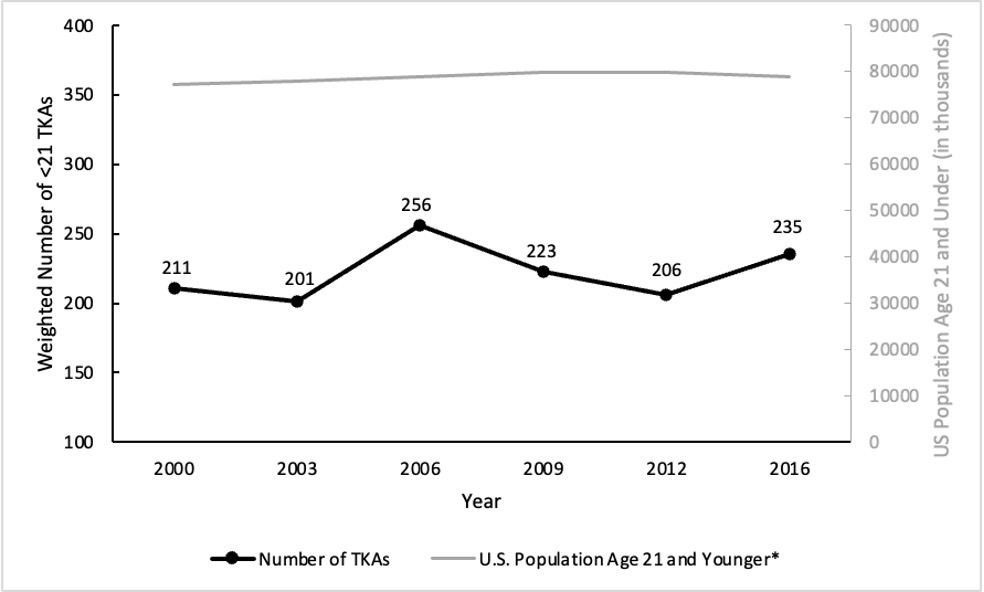Back
Poster Session B
Juvenile idiopathic arthritis (JIA) and pediatric joint disorders
Session: (0850–0880) Pediatric Rheumatology – Clinical Poster I: JIA
0878: A United States Nationwide Analysis of Total Knee Arthroplasty in Patients < 21 Years Old
Sunday, November 13, 2022
9:00 AM – 10:30 AM Eastern Time
Location: Virtual Poster Hall
- JG
John Gibbons, BA
Columbia Vagelos College of Physicians and Surgeons
Greenwich, CT, United States
Abstract Poster Presenter(s)
John Gibbons1, Cynthia A. Kahlenberg1, Deanna Jannat-Khah, DrPH, MSPH1, Alexander B. Christ2, Susan Goodman1, Peter Sculco1, Mark Figgie1 and Bella Mehta3, 1Hospital for Special Surgery, New York, NY, 2Keck School of Medicine of USC, Los Angeles, CA, 3Hospital for Special Surgery, Weill Cornell Medicine, New York, NY
Background/Purpose: Total knee arthroplasty (TKA) is rarely performed in patients under 21 years old and may be performed in this population due to conditions such as inflammatory arthritis or juvenile idiopathic arthritis (JIA), malignant or non-malignant tumor, avascular necrosis, sepsis, trauma, hemophilia, or dysplasia. However, the number of patients < 21 undergoing TKA in the United States (U.S.) is unknown. In one of the largest U.S. studies of an institutional arthroplasty registry, only 19 TKAs were performed in patients < 21 out of ~30,000 primary TKAs over 34 years—a majority of which were for JIA1. The purpose of this study was to evaluate trends in the use of TKA in patients < 21 in the U.S. Additionally, we aimed to determine the epidemiological characteristics and to describe the hospitals in which this procedure is performed.
Methods: We retrospectively analyzed the Kids' Inpatient Database (KID), a national weighted sample of all inpatient hospital admissions in the U.S. for ~4,200 hospitals in 46 states in patients under 21 years old. We used International Classification of Diseases, Ninth Revision (ICD-9) and ICD-10 codes to identify patients undergoing TKA from 2000 through 2016 and determine primary diagnosis. Descriptive statistics such as means and percentages, along with their 95% confidence intervals (95% CI) were calculated using the appropriate sample weights as recommended by the Agency for Healthcare Research and Quality for use with the KID dataset.
Results: The total weighted number of TKAs performed in patients < 21 from 2000-2016 was 1,331 (Table 1); the number of TKAs performed per year remained relatively stable (Figure 1). The mean age of patients undergoing TKA was 14.8 years (95% CI: 14.4, 15.2), and 48.8% of the cohort was female. Among tumor patients, a higher proportion identified as Hispanic (22.1%) or Other race (12.6%) compared to the non-tumor cohort. 70.3% of TKAs were performed for a primary diagnosis of tumor, and the number of TKAs for malignant tumors has increased slightly over the study period (Figure 2). In contrast, use of TKA for inflammatory arthritis / JIA decreased by over 70% over the study period. The majority of TKAs were performed in urban teaching hospitals and in facilities with a large bed size.
Conclusion: From 2000-2016, the number of TKAs performed per year in patients < 21 years old in the U.S. has remained constant. The majority of TKAs were performed due to tumors and were in urban teaching hospitals with a large bed size, which likely reflects the complexity and rarity of these procedures. While the use of TKA for malignant tumor has increased slightly over the study period, use for inflammatory arthritis / JIA has decreased significantly over the past two decades, likely due to improvements in medical management of inflammatory arthritis / JIA patients.
References
1. Martin JR et al. Adolescent total knee arthroplasty. PMCID: PMC5484984
 Table 1. Characteristics of patients < 21 years old undergoing TKA and hospitals in which TKA is performed
Table 1. Characteristics of patients < 21 years old undergoing TKA and hospitals in which TKA is performed
 Figure 1. Weighted number of TKAs performed in patients < 21 years old per year. * U.S. population estimates from the National Center for Education Statistics. Table 100.10. Estimates of resident population, by age group: 1970 through 2019. https://nces.ed.gov/programs/digest/d19/tables/dt19_101.10.asp (accessed 12.05.21).
Figure 1. Weighted number of TKAs performed in patients < 21 years old per year. * U.S. population estimates from the National Center for Education Statistics. Table 100.10. Estimates of resident population, by age group: 1970 through 2019. https://nces.ed.gov/programs/digest/d19/tables/dt19_101.10.asp (accessed 12.05.21).
.jpg) Figure 2. Weighted number of TKAs performed per year for top three primary diagnoses. ** Per HCUP guidelines, data representing ≤ 10 cases have been omitted to protect patient confidentiality
Figure 2. Weighted number of TKAs performed per year for top three primary diagnoses. ** Per HCUP guidelines, data representing ≤ 10 cases have been omitted to protect patient confidentiality
Disclosures: J. Gibbons, None; C. Kahlenberg, None; D. Jannat-Khah, DrPH, MSPH, Cytodyn, AstraZeneca, Walgreens; A. Christ, Smith & Nephew, Intellijoint Surgical; S. Goodman, Novartis, UCB; P. Sculco, None; M. Figgie, Wishbone, Lima, Mekanika, HS2; B. Mehta, None.
Background/Purpose: Total knee arthroplasty (TKA) is rarely performed in patients under 21 years old and may be performed in this population due to conditions such as inflammatory arthritis or juvenile idiopathic arthritis (JIA), malignant or non-malignant tumor, avascular necrosis, sepsis, trauma, hemophilia, or dysplasia. However, the number of patients < 21 undergoing TKA in the United States (U.S.) is unknown. In one of the largest U.S. studies of an institutional arthroplasty registry, only 19 TKAs were performed in patients < 21 out of ~30,000 primary TKAs over 34 years—a majority of which were for JIA1. The purpose of this study was to evaluate trends in the use of TKA in patients < 21 in the U.S. Additionally, we aimed to determine the epidemiological characteristics and to describe the hospitals in which this procedure is performed.
Methods: We retrospectively analyzed the Kids' Inpatient Database (KID), a national weighted sample of all inpatient hospital admissions in the U.S. for ~4,200 hospitals in 46 states in patients under 21 years old. We used International Classification of Diseases, Ninth Revision (ICD-9) and ICD-10 codes to identify patients undergoing TKA from 2000 through 2016 and determine primary diagnosis. Descriptive statistics such as means and percentages, along with their 95% confidence intervals (95% CI) were calculated using the appropriate sample weights as recommended by the Agency for Healthcare Research and Quality for use with the KID dataset.
Results: The total weighted number of TKAs performed in patients < 21 from 2000-2016 was 1,331 (Table 1); the number of TKAs performed per year remained relatively stable (Figure 1). The mean age of patients undergoing TKA was 14.8 years (95% CI: 14.4, 15.2), and 48.8% of the cohort was female. Among tumor patients, a higher proportion identified as Hispanic (22.1%) or Other race (12.6%) compared to the non-tumor cohort. 70.3% of TKAs were performed for a primary diagnosis of tumor, and the number of TKAs for malignant tumors has increased slightly over the study period (Figure 2). In contrast, use of TKA for inflammatory arthritis / JIA decreased by over 70% over the study period. The majority of TKAs were performed in urban teaching hospitals and in facilities with a large bed size.
Conclusion: From 2000-2016, the number of TKAs performed per year in patients < 21 years old in the U.S. has remained constant. The majority of TKAs were performed due to tumors and were in urban teaching hospitals with a large bed size, which likely reflects the complexity and rarity of these procedures. While the use of TKA for malignant tumor has increased slightly over the study period, use for inflammatory arthritis / JIA has decreased significantly over the past two decades, likely due to improvements in medical management of inflammatory arthritis / JIA patients.
References
1. Martin JR et al. Adolescent total knee arthroplasty. PMCID: PMC5484984
 Table 1. Characteristics of patients < 21 years old undergoing TKA and hospitals in which TKA is performed
Table 1. Characteristics of patients < 21 years old undergoing TKA and hospitals in which TKA is performed Figure 1. Weighted number of TKAs performed in patients < 21 years old per year. * U.S. population estimates from the National Center for Education Statistics. Table 100.10. Estimates of resident population, by age group: 1970 through 2019. https://nces.ed.gov/programs/digest/d19/tables/dt19_101.10.asp (accessed 12.05.21).
Figure 1. Weighted number of TKAs performed in patients < 21 years old per year. * U.S. population estimates from the National Center for Education Statistics. Table 100.10. Estimates of resident population, by age group: 1970 through 2019. https://nces.ed.gov/programs/digest/d19/tables/dt19_101.10.asp (accessed 12.05.21)..jpg) Figure 2. Weighted number of TKAs performed per year for top three primary diagnoses. ** Per HCUP guidelines, data representing ≤ 10 cases have been omitted to protect patient confidentiality
Figure 2. Weighted number of TKAs performed per year for top three primary diagnoses. ** Per HCUP guidelines, data representing ≤ 10 cases have been omitted to protect patient confidentiality Disclosures: J. Gibbons, None; C. Kahlenberg, None; D. Jannat-Khah, DrPH, MSPH, Cytodyn, AstraZeneca, Walgreens; A. Christ, Smith & Nephew, Intellijoint Surgical; S. Goodman, Novartis, UCB; P. Sculco, None; M. Figgie, Wishbone, Lima, Mekanika, HS2; B. Mehta, None.

